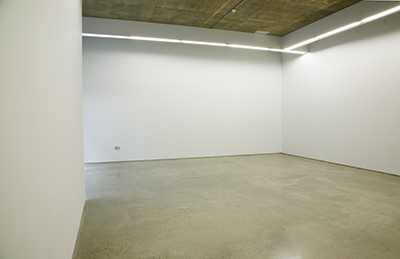Carrie Miller contemplates the end of the white cube gallery space…
I was speaking to one of Australia’s prominent contemporary art collectors recently who told me that he buys 90 percent of his work online. Sight unseen, the art gets delivered to his apartment and he admits to a rush of excitement when tearing back the bubble wrap. His reason for not getting to exhibitions any more is that he’s “time poor”. (I think that’s another way of saying he’s too busy making money to go see the stuff that’s he’s paying for).
Speak to many dealers and they will tell you this is becoming the norm.
No doubt purists would lament this cultural shift. No longer do collectors have to engage with the work directly; to form their own aesthetic judgments and develop their own taste through contemplative reflection. Now they can read a blog, find out who’s hot, and get a readymade collection delivered to their door.
What this picture doesn’t take into account of course is the reality of how work was bought before digital media came along. Galleries have always had waiting lists for artists with heat and collectors, lining up like sheep, often just acquired whatever they could get their hands on. Apparently it’s a given that whatever work is on the invitation is most likely to sell first.
Nevertheless, is there anything really wrong with the possibility of the death of the white cube gallery?
There’s no doubt that digital media has been an emancipatory force in some ways. This is particularly true for creative content production and consumption within the media. The public sphere has been democratised through the rise of citizen media, enabled by the fact that the means of production have, to some extent, been taken out of the hands of the powerful few. The average person can produce and disseminate content which is often interactive – cutting out the middle man who made money from other people’s creativity.
So, will an increasing engagement with the digital world be a positive thing for artists in the same way? Or are material cultural products that are traditionally defined by their very materiality a qualitatively different case?
It’s pretty standard stuff for artists – who let’s face it, are the champions of the oppressed group mentality – to bitch about the conventional gallery system. On the surface, it can appear some gallerists keep very civilized hours for the large chunk of commission they receive. So, is there a utopian future where artists, through websites and other forms of digital media, will assume a primary role in the promotion of themselves and the sale of their work directly to collectors?
Probably not. As long as there’s a quid to be made, those with the expertise in making it will keep doing so. But the digital world will certainly tranform the artworld – it already has. And while there will probably always be the white cube, it will no longer be the singular way to engage with the commercial side of art.
Already we have online galleries; this year saw the first major online art fair. Smart gallerists are now utilizing phone apps, Facebook, Twitter, Flickr, and YouTube to create a sense of community around their galleries and their artists.
Sure, now someone can download wallpaper or a screensaver of an artwork that they might never get to see – but is that such a bad thing? It allows a lot more people to connect to the artworld that would traditionally feel excluded from it.
And I don’t know about you, but the works that most deeply affected me when I first showed an interest in art were just pictures in books. Growing up, I was at La Mancha caravan park in Gosford for my holidays – not the Louvre. In fact, most of those paintings I’ve still never clapped eyes on – but they got under my skin nevertheless and given me a life-long enthusiasm for art. That’s why I bother to go and see work in the flesh now.
And there will still be the need for work to be shown – whether through pop-up galleries, dealers own homes or the homes of collectors, or artists’ studios.
I reckon the big question will be: if dealers no longer need expensive shopfronts (and real estate has always been the biggest overhead for high-end, inner-city galleries) will they function more like agents and therefore take a smaller slice of the cash for the selling of work? Now, that’s something we can all look forward to.



Pingback: Tweets that mention Farewell white cube, hello brave new internets | The Art Life -- Topsy.com
is this the triumph of invisible art?
or should we interpret the power point?
Well, that’s exciting re dealers, shop fronts and a smaller slice of cash. “more like Agents” fabulous.
My biggest issue is the 50% commission. It no only makes the artist get less but the patrons pay more. it’s stupid and not working at all for either of these groups.
I just sold a work off my website, i could offer the collector a cheaper price than if it was at a gallery that charges 50% and I got the cash in four days. Pure Joy.
I would love to have a agent, sounds less double sided than a dealer.
Cool and interesting article … I think it will just be a melding of the two – galleries cant be replaced, even by something online. Case in point – I had always liked Monet, but had only ever really seen his pieces in a book – I thought they were colorful and cool, but didn’t have a massive appreciation .. when I saw a bunch of them in Switzerland, their size impressed upon me how much I had missed by merely seeing it in a book – now Monet is one of my favorite painters where before I was fairly neutral in regards to his work … its all pretty subjective really.
Being pedantic and I’m in the mood to be pedantic, white cube galleries don’t only function as places from which art objects are sold. They are also the norm for public art musuems and galleries and what about the whole social and networking functions of the artist run, predominantly white cube spaces?
I had thought Warhol was good but not fantastic, from seeing his work in books and then I saw his work at a show in Chicago, years and years ago. It changed my mind totally about the importance of experiencing the work .
Surely there are no galleries who charge 50% in Australia; only a scoundrel would the artist like that. Please name and shame the 50%ers here.
Artists are always dealing with paradigms, while art has a way of transcending them.
Pingback: Throw ‘em to the lions | The Art Life
The closure of White Cube should make all artists sit up and wonder how will I sell my art in 5 years time when there are no galleries..??
The present system whereby galleries spend huge amounts of time and money searching for and marketing unknown artists is to be believed.
I would hazard a guess that quite a few artists that presently sell on line do so because the customer has seen the paintings in a gallery and then did an Internet search, thus the dirty deed of dealing with the artist directly at reduced price.
For the less knowledgeable of greedy artists who think that 50% commission is too much to pay, let me just give you some indication of what’s involved..
A. Think back to when you were not represented by a gallery…who started to market your work??
B. 50% commission is the only way a gallery can keep going.. Most artists do not pay Tax , VAT, Business Rates or High Property Rents.
C. Would you be where you are now if a gallery had not exhibited your work in the 1st place? I don’t think so…
The way I see the future for artists is:
Your direct sales will eventually deplete, your creativity will fall by the wayside, (too much time spent trying to sell rather than paint)
If Tracy Emin & Damien Hurst were not first taken on by Saatchi I very much doubt they would be in such a privileged position today.
Galleries play a huge part in the success of most artists..
Don’t be so naive to think otherwise.